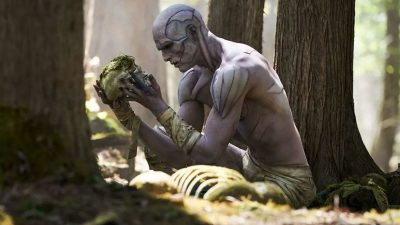In 2016, filmmaker Alice Diop attended the trial of Fabienne Kabou, a young Senegalese woman who admittedly left her 15-month-old daughter to drown on a beach near the town of Saint-Omer.
Much like herself, her protagonist Rama (Kayije Kagame) attends a haunting trial. That of Laurance Coly (Guslagie Malanda), once ambitious philosophy student turned murderer. Laurence is wearing earthly colored clothes that make her completely blend in with the walls of the courtroom. She is an emigrant silenced and hidden, trapped in colonial detachment. On the other hand, Rama is a professor and novelist, an empowered black woman with a complicated relationship to her Senegalese mother, and to her own identity. She is at the trial doing research for her new book “Medea Shipwrecked”.
Saint Omer is an edgy and emotionally turbulent courtroom drama painted with thick brushstrokes of mystery. It raises uncomfortable questions about legacy, brushed off members in our society, memories and traumas. It meditates on what is engraved in our DNA and on the unbreakable bond between mother and daughter, in spite of differences and tricky complications.
The movie is the narrative-fiction debut of Alice Diop (Nous), French filmmaker born to Senegalese immigrant parents. Her set-up of mixing the trial with Rama’s own internal journey and themes of parenthood, discrimination and isolation in present day France is simple yet incredibly powerful. It is dialogue heavy and physically constrained.
One could think, Saint Omer would do a great stage play as well. However, Diop chooses to tell her story in a way that could work only on film. She relies on elongated pauses, long shots of visceral reaction rather than of spoken words, slow camera movements and greatly lit static shots. One of the best examples for the latter might be little Rama eating cornflakes in her family’s packed kitchen at night. You can almost touch the coldness of the pavement, the loneliness and innocence of the moment, her life with her mother and yet in isolation from her. All this pulsates in the little scene while, through the kitchen window, an entire city runs the course of night; cars pass on the highway and building lights blink wearily from afar. Diop also frequently references Alain Resnais’ Hiroshima Mon Amour and Pier Paolo Pasolini’s Medea, which give another cinematic as well as universally human layer to the film. With references, otherworldly sounds and shots of nature we seamlessly transition from present to past, from reality to imagination.
Understanding others’ and our own motivations sometimes are ambiguous. On many occasions, Diop’s characters are not able to explain their own actions and motivations “I don’t know. I don’t know. I don’t know.” – they keep on “chanting”. Chanting might strike you as a peculiar word in this context. However, the dialogue hand in hand with the soundtrack and sound design evoke shamanic rituals and prehistoric prayers. Something of almost animalistic nature gets triggered in all of us. Something instinctive and timeless starts bubbling under our skin. “I don’t know. I don’t know. I don’t know.” In human nature, sometimes there is no logic. Motivations have a tendency to be anchored deeper than that.
Saint Omer is beautifully written, tightly and meticulously crafted with much symbolism in set design, camera movement and framing choices. The director works almost like a surgeon who knows where to cut and how to stitch in order to bring healing. All the acting performances are top-notch – and unfortunately, not given the award buzz they deserve. The total presence and constant truthfulness of Diop’s entire cast is almost palpable. The empathetic judge (Valérie Dréville), the self-deprecating lover (Xavier Maly), the razor sharp and oppressed suspect and the leading lady sinking into an existential crisis.
The writing, similarly to its protagonists, is eloquent and intelligent yet never boasts with its cleverness. “Is there anyone who does not know who Medea is?” asks Rama from her editor, when he questions her title choice for the novel. And the beauty here is that Diop does not want us to know things, she does not want us to determine who is innocent and who is guilty, she does not want us to see everything that happens. Instead, she lets us go with the flow of the feelings her movie stimulates, the questions it provokes. Our ticket for the ride with these characters is our shared sense of being, loving, fearing and doubting.
Diop has masterfully created a movie that has the ability to bring us an inch closer to each other. Saint Omer is a wonderful gem to be seen and experienced in a packed auditorium.
Saint Omer is now available on VUDU, Prime Video and can be seen in theatres.
~ by Dora Endre ~

























Comments